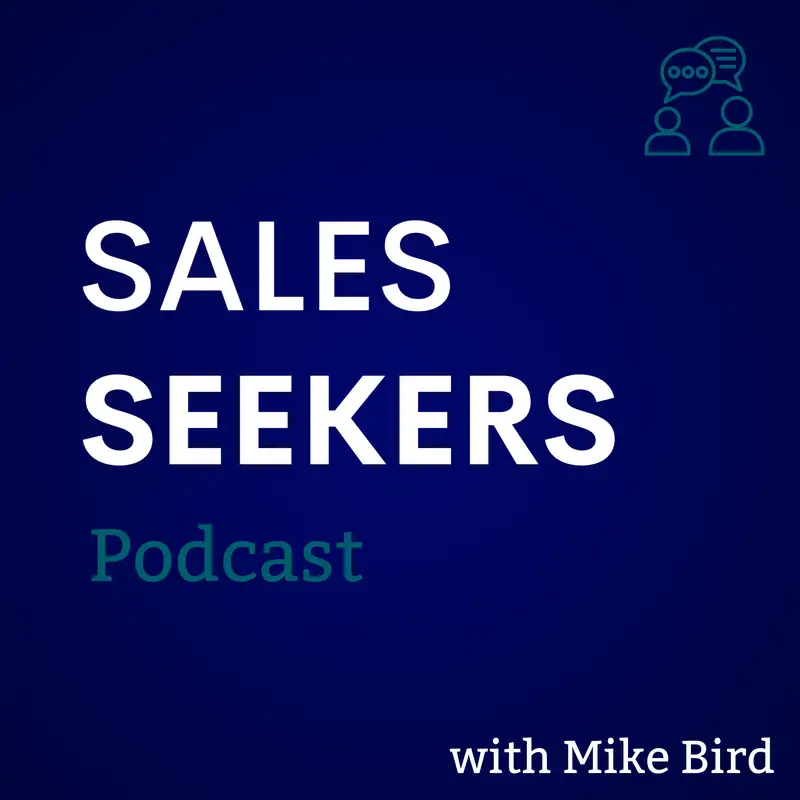It Takes a Village to Land a Sales Job
Sales Seekers Podcast 011: It Takes a Village to Land a Sales Job
===
[00:00:00] Intro
---
Mike Bird: Hey there, you're listening to Sales Seekers. I'm Mike Bird. And today I want to talk about the idea that it really does take a village to land a job these days.
A lot of job seekers that I come across often try and go it alone, or almost fully alone when looking for work. And this can be a really costly error for a few reasons.
It can lead to burnout caused by excessive cold applications and not really using warmer connections to gain entry into a hiring cycle.
It can feel really lonely, if you have no one to vent to or ideate with. That can be really tough.
And it can lead to longer, slower searches as opposed to one that's more accelerated by the power of human connections and your network.
[00:00:42] Two sorts of people we want in our corner
---
Mike Bird: There are two general kinds of connections with others that we ideally want to have when going through a job search.
Number one: the people that we can turn to for emotional, social, and mental support. These are often friends and family. Especially when we're working through a sustained job search, it's important to have a support network around you. Do you remember how a lot of us felt during the COVID pandemic? Super isolated and maybe even helpless because we couldn't alter our circumstances much, if at all?
Sometimes the job search can feel exactly like this. And while I'm not a psychologist, I know that loneliness can be a real challenge to mental health and connection to others is a great way to alleviate this.
The other kind of folks that we want to have in our corner when we're going through this process are people who can help generate job leads.
And these are often former colleagues, clients, vendors, our peers in the industry that we are going into, or that we are pursuing. And I want to talk a little bit more about this second group for the rest of the episode.
[00:01:46] Mark Granovetter's landmark research
---
Mike Bird: As easy as it is to rely on people who know you well, we're often missing out on a lot of opportunities if we're not tapping into our weaker ties. In fact, there's a famous paper from the early 1970s by Stanford sociologist, Mark Granovetter, called _The Strength of Weak Ties,_ which looked at how a few hundred men had found their jobs and talks to the value of collaborating with people who aren't as close to us.
I'll link to a couple of things related to this paper in the show notes.
Granovetter is quoted in a 2022 interview saying "your weak ties connect you to networks that are outside of your own circle. They give you information and ideas that you otherwise would not have gotten."
It turns out that when we only focus on working through people who are close to us, we aren't actually broadening our exposure to new opportunities as much as we might think. The more our weaker ties know that we're on the move, and as long as they're at least somewhat familiar with our work, the more they can be of help in a job search.
[00:02:46] Putting this into action for your job search
---
Mike Bird: So here's an actionable tip for you to apply. If you're trying to generate new conversations with potential employers.
Start by making a list of colleagues that you've worked with in the past, who know about the kind of work you do well. Add to the list, people like past clients, vendors you've gone through, contacts who have moved on and are perhaps in careers that may be exciting to you in the sales world.
A funny example of this for me is that I'm going for lunch soon with a former bartender of mine, from back in the day when I spent much more time in bars than I do now. He's now an Account Executive at a local tech company that I'd love to learn more about, even if I don't actually end up pursuing a role at that organization in the near term.
Once you've built out this list, note down whether you've reached out to each of these individuals about your current job search efforts. And when you go and reach out to folks on the list who aren't aware of what you're doing, make sure you're delivering as targeted and as clear of a description of what you're looking for in your next job as possible.
It's very hard for someone to put you in contact with someone else if you only share something like, " Hey, I'm looking to go from an SDR role to an AE role somewhere." Instead it's much easier if you state something that's more like, "Hey, I'm looking to go from my SDR seat to AE role in an early-stage company that might not be able to pull in experienced AE talent as easily, and they may be more open to taking a chance on developing someone for the role. These could be 10-, 15-, 20-, 25- person companies. Do you know, anyone working in an early stage company like that?"
Even if they don't know the hiring manager for an open role personally, they may know a company that fits that bill. And that gives you a place to go and do some research on and start to break into that circle, via things like networking calls and informational interviews.
And that's it. It's a really simple tip. If you found this helpful, you might appreciate reading the other four tips that I share on my Job Search Preparation Checklist, which you can download from saleseekers.ca. I can link to that in the show notes as well.
Let me know if this sparks any questions for you. Send me a note at mike@salesseekers.ca or connect with me on LinkedIn. I wish you the best as you engage your full circle of connections and we'll catch you again in a couple of weeks. Bye for now.

